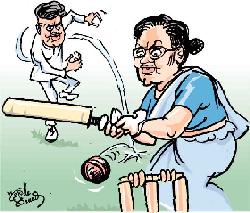23rd January 2000
Ranil's googly: Presidency out or not out?
Front Page|
News/Comment|
Plus| Business| Sports|
Sports Plus| Mirror Magazine

![]()
 Although
Opposition Leader Ranil Wickremesinghe's statement is somewhat complicated,
what he wants to say is that despite reservations, his party will not obstruct
the passage of the draft constitution if the government thinks it is the
only solution available to it.
Although
Opposition Leader Ranil Wickremesinghe's statement is somewhat complicated,
what he wants to say is that despite reservations, his party will not obstruct
the passage of the draft constitution if the government thinks it is the
only solution available to it.
The statement does not directly say that the UNP will vote for the draft constitution. But it indicates that the UNP will help the Government to get the constitutional amendment passed, provided that the PA supports a UNP-sponsored constitution in the event the proposed reforms fail to bring in peace.
This is like a googly bowled by Mr. Wickremesinghe to the head of the government. The bowler's action is not attractive but the delivery is powerful and deceptive. It is not clear how the President is going to face that ball.
The President has said repeatedly that she could not end the war because Mr. Wickremesinghe has failed to provide her with the required two thirds majority in parliament for the adoption of the draft constitution.
At the presidential election she went further and said that after winning the presidential election she would tear J.R. Jayewardene's constitution into pieces and get her own draft constitution adopted.
Although her rhetoric was aimed at the gallery, no such thing happened after the election.
The leader of the alternate UNP group, Sarath Amunugama, had promised that he would help her get the required two thirds majority through defections. That too did not take place.
However, with the UNP leader's promise, it is now possible for the Government to get the new constitution adopted even before holding the parliamentary elections.
But, if the new constitution is adopted the President will have to give up the executive presidential system and go to Parliament as Prime Minister. The crucial question is whether she is prepared to do that.
Under the present constitution the executive President is not directly answerable to Parliament. Although the President approves or initiates the government's policies, Parliament cannot criticise the President. She or he is not subject to the judiciary during her or his term of office on any matter other than an election petition. Parliament virtually has no power to remove the President for whatever offence, however serious.
Although the President does not sit in Parliament, she or he is the head of the Cabinet. Cabinet ministers are appointed by the President. The President can retain any number of Cabinet portfolios he or she likes.
Under a parliamentary form of government, the picture is totally different with the Prime Minister — the head of government — sitting in Parliament. He or she can be criticised. He or she can be prosecuted for any offence.
He or she should participate in parliamentary debates and answer questions. The Prime Minister can be overruled by a majority vote in Parliament. Even the MPs of the Government party change the head of Government.
It is unthinkable that a leader who has enjoyed the powers of a dictatorial presidential system will like to change over to a system in which she or he will have much less power in a position vulnerable to criticism and even ousters.
The President cannot now back off from her promise to abolish the executive presidency. There is no doubt that the members of her Cabinet and her parliamentary group would like her to step down from her present all powerful position. Under the system of dictatorial presidency, ruling party members could be treated like a group of serfs. Under the present system there is little room for free exchange of ideas either in the Cabinet or in the Government parliamentary group. There is little possibility that a leader can be criticized even when very serious wrongs are done.
If a change of system occurs, it will inevitably broaden the democratic freedom in the country.
However, the basic question now is whether the President will agree to such a change. In the circumstance that the UNP is going to support the new draft constitution, she will be placed in a difficult position before the general public, her own Cabinet ministers, the Government party MPs, the PA party members, the minority communities of the country as well as the international community.
That might be exactly what Mr. Wickremesinghe expected from his googly ball.








![]()
Front Page| News/Comment| Editorial/Opinion| Plus| Business| Sports| Sports Plus| Mirror Magazine
Please send your comments and suggestions on this web site to


